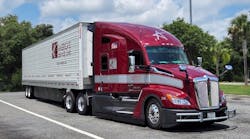Despite the escalation in rhetoric over the cross-border trucking debate, a lawyer for the National Chamber of Autotransporte de Carga (CANACAR), the Mexico’s trucking lobby, told Fleet Owner that a compromise is still possible to avoid further damage to the U.S.-Mexican trade relationship.
Pedro M. Ojeda Cárdenas who filed a $6 billion suit under NAFTA Chapter 11 rules against the U.S. on behalf of CANACAR, said if the U.S. restarts the controversial cross-border trucking program in some form it “could open the door to compromise” of the suit.
“I see the position of the Mexican trucking industry,” Attorney Ojeda said. “We don’t want to harass anyone here. If [the U.S.] government comes with a program that is good and beneficial, the Mexican trucking industry would be open to discussions.”
Ojeda said financial losses to the Mexican trucking industry due to U.S. border policies in the past three years-- pegged at $2 billion a year-- is how the $6 billion figure was obtained. The suit will be heard at a later date by an international arbitrator under NAFTA rules.
The lawyer said the suit is not a reaction to the U.S. killing the cross-border demonstration project, but rather a response to years of border trade issues. “The Mexican trucking industry never agreed with the program,” Ojeda said. “The fact is we are open to the United States but they are not open to Mexico.”
According to Ojeda, the cancellation of the border program by Congress and President Barack Obama, who has said he would like to see another program in place soon, is just the latest dustup in a dispute that dates back to 1982. Prior to 1982, Ojeda said, Mexican truckers “were able to go into the United States. In 1982, the Teamsters and other groups started to oppose the entrance to the U.S.”
The Law of Moratorium was then agreed to by the countries, permitting only those Mexican carriers with current permits to continue operating inside the U.S. border, and then only within a 25-mi. commercial zone. Eventually, in 1994, NAFTA was ratified and borders were supposed to be open to promote commerce across North America. The U.S. agreed in 1998, according to Ojeda, to open the border to Mexican trucking fleets. “But the United States did not open its border,” whereas Mexico did, he said.
A NAFTA Tribunal agreed with Mexico in the dispute, ordering the U.S. to open the border in 2001, which Ojeda said the Bush administration indicated it would. Mexican companies then bought equipment to meet stricter U.S. safety rules. “They lost that money,” Ojeda stated.
Ultimately, the Bush administration came up with the cross-border demonstration project in 2007 that allowed registered Mexican carriers to operate inside the border of the U.S. That program was eliminated when Congress passed the 2009 omnibus appropriations bill, which Obama signed into law.
Since then, Obama and Transportation Secretary Ray LaHood have both said they will work toward putting another program in place. In retaliation for the cancellation of the program, the Mexican government slapped $2.4 billion worth of tariffs on U.S. goods.
While Ojeda said a new program would not necessarily mean the suit would be dropped, it could open the door to negotiations. After all, he pointed out, the Mexican trucking industry just wants what the U.S. trucking industry has – free access.




